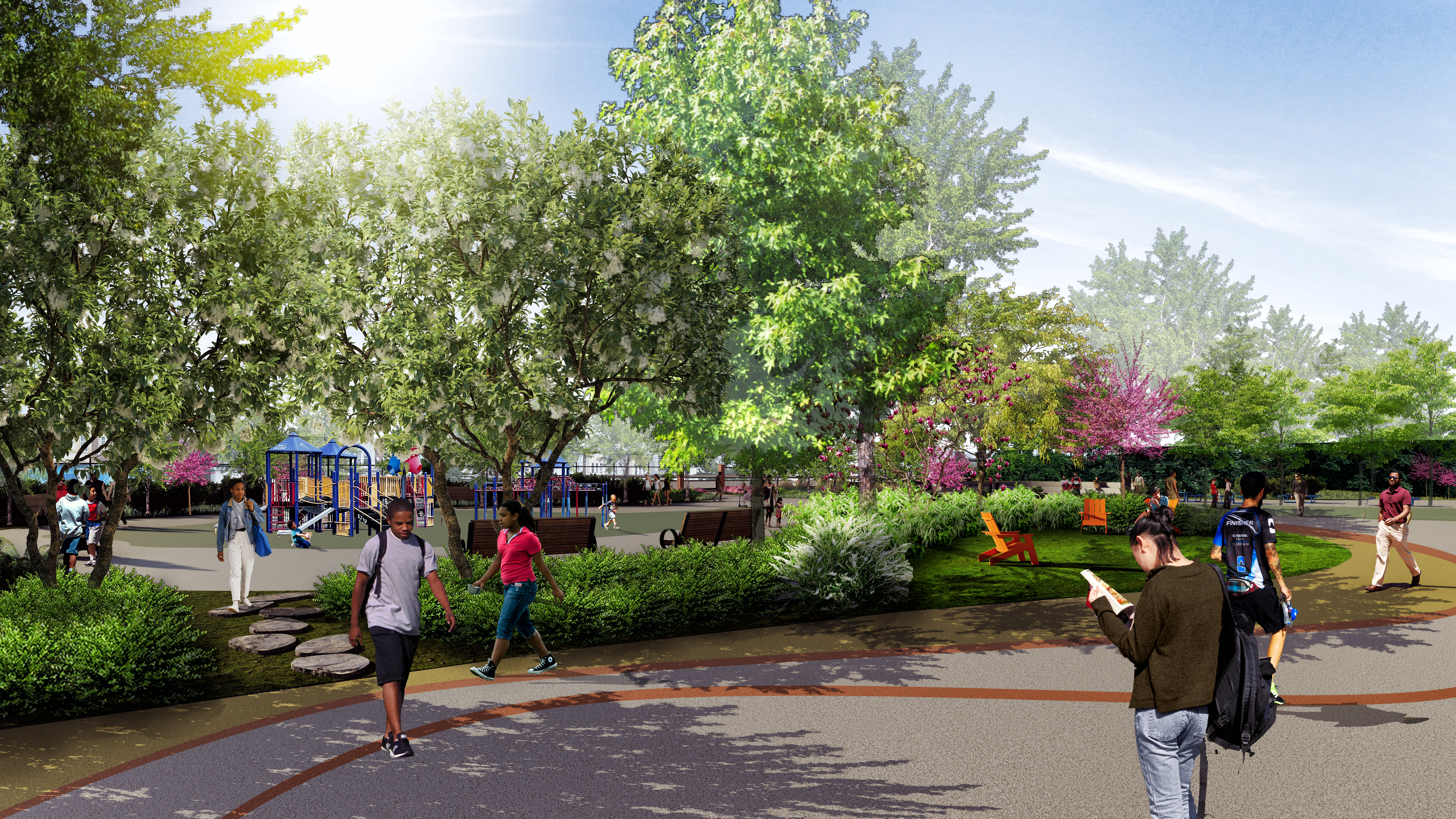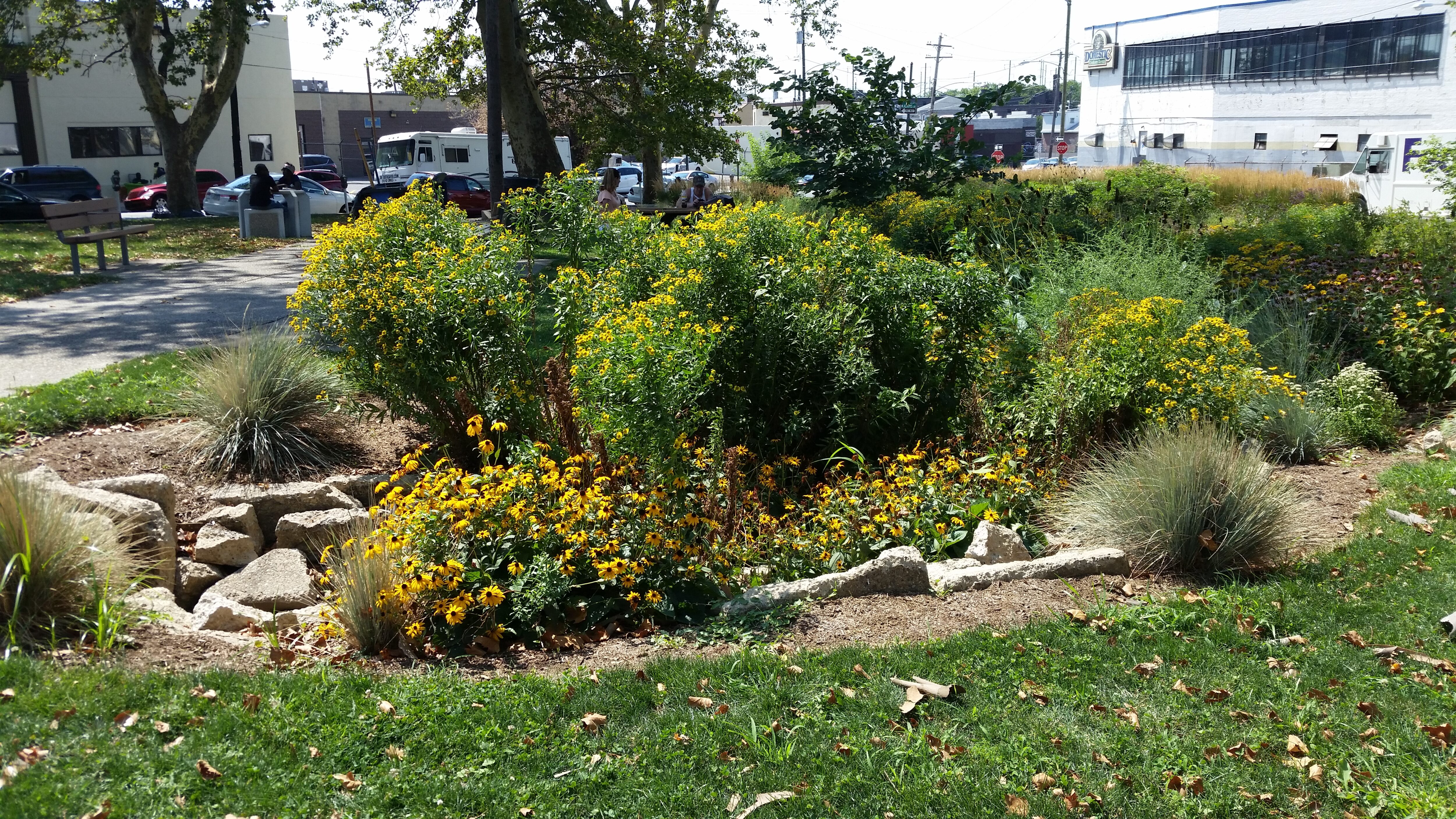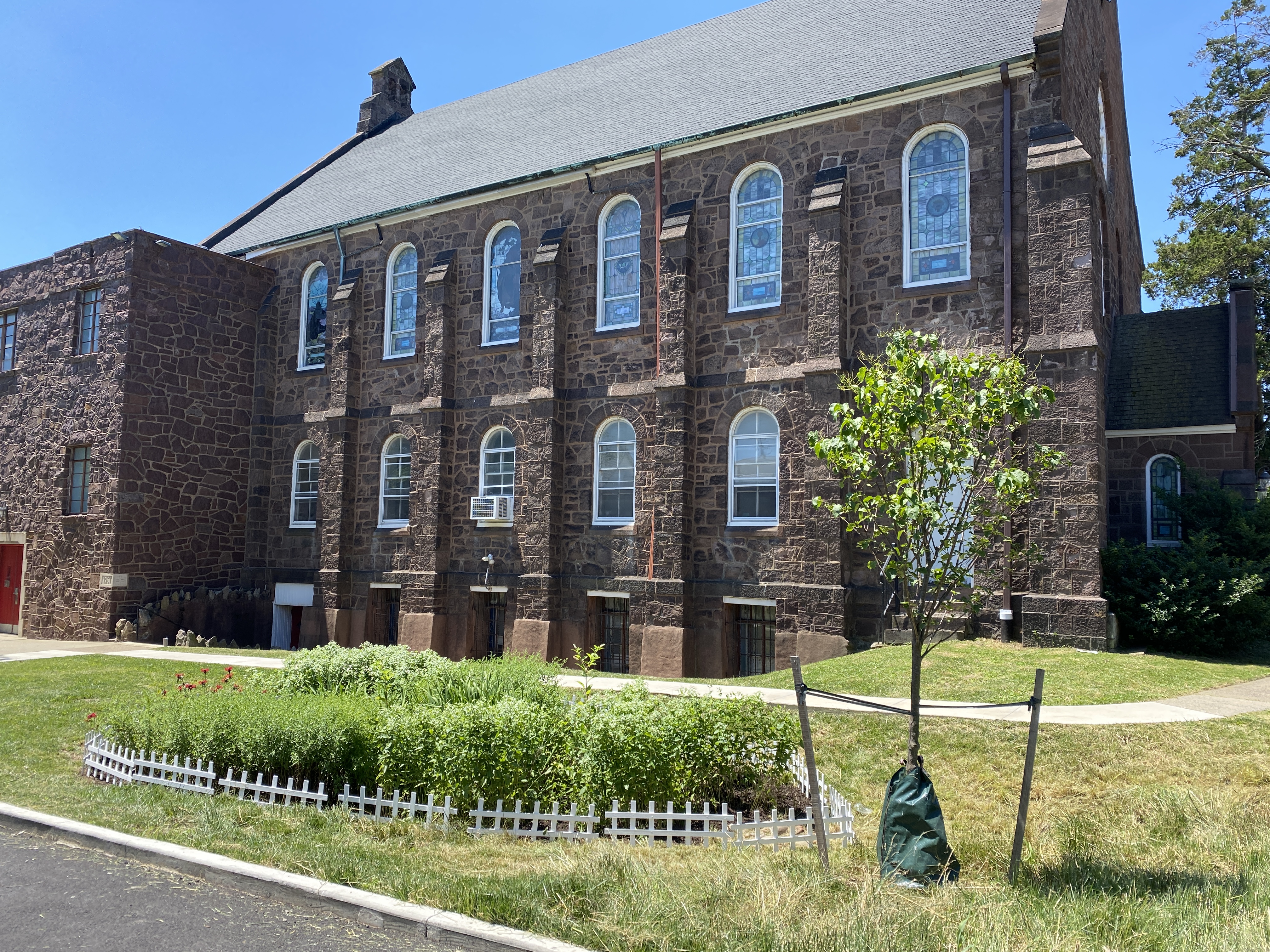For over a decade, dozens of non-residential properties – spanning from schools to businesses – have taken advantage of our Stormwater Grants program. Through this signature PWD resource, we help properties spruce up their spaces and reduce water bills – all while reducing combined sewer overflow pollution in our creeks and rivers.
We’re excited to announce that 12 non-residential properties across the city have been recently awarded new green stormwater infrastructure (GSI).
Throughout the last fiscal year, more than $13,000,000 in grants have been allocated for these retrofits (installing GSI on existing properties.)
“This year, we received a lot of great applications and are excited to see so many private property owners who understand the value and impact that stormwater management projects can have on their properties and in their communities,” says Beth Anne Lutes, manager of PWD’s Stormwater Billing and Incentives program.
Since Green City, Clean Waters started 13 years ago, we’ve installed GSI retrofits on hundreds of properties through the grants incentive, totaling more than $192 million awarded to non-residential property owners. Roughly 34 percent of the Greened Acres implemented through Green City, Clean Waters were made possible by non-residential properties taking advantage of our Stormwater Incentives, including the Grants Program.
From staple recipients like schools to newer ones like art studios, this year’s batch of grant winners joins the family of Philly properties keeping our local waterways clean.
Planting Seeds for a Green Future
The Nature Conservancy (TNC), Resilient Communities Stormwater Initiative (RSCI), and the School District of Philadelphia joined forces to advocate for GSI installations in the following Southwest Philadelphia schoolyards:
TNC and RCSI work lies at the “intersection between climate, social, and environmental justice with a focus on investing in communities and neighborhoods that have historically been underrepresented and under-resourced.”
These 3 schools will transform existing blacktop schoolyards into green spaces with environmental and educational benefits.
These sites will receive various types of GSI, including rain gardens, subsurface basins, porous pavement, porous pavements, and new depaving. Added together, the schools’ new systems will manage more than 141,000 gallons of overflow per typical 1” storm event.
“As part of the Resilient Communities Stormwater Initiative (RCSI), The Nature Conservancy is excited to partner with the School District of Philadelphia on these GSI projects that will provide environmental, community, and climate resiliency benefits,” says Lyndon DeSalvo, Urban Conservation Project Manager, The Nature Conservancy (RCSI Partner). “These projects will also advance implementation of the Kingsessing Green Vision Plan, a community-led plan for amplifying investment in the Kingsessing neighborhood of Philadelphia to increase access to green space and support community-wide resilience. We are grateful to PWD for supporting these efforts.”

Last summer’s “walkshop” at Comegys School as part of the RCSI’s Kingsessing Green Vision Plan Workshop series. (Image: SALT Design Studio)
These projects continue our existing partnership with the School District of Philadelphia. The School District of Philadelphia has been an integral collaborator in the history of Green City, Clean Waters.
Currently, nearly 50 School Districts of Philadelphia schoolyards have formally worked with us to implement green stormwater infrastructure on their properties.
The green stormwater infrastructure projects created by the School District of Philadelphia and all partner organizations, including The Nature Conservancy, collectively manage more than 2.2 million gallons of stormwater runoff per typical storm event.
“The School District of Philadelphia is striving to make greener, cleaner, and healthier schoolyards to welcome all students to school,” says Emma Melvin, Green Infrastructure Program Manager, School District of Philadelphia. “These green schoolyards will provide a place of respite, to play and learn while teaching students about environmental stewardship.”

Rendering of the upcoming Weir S. Mitchell School project (Image: SALT Design Studio)
Art Joins Our Green Landscape
For the first time in the history of the Stormwater Grant program, PWD has awarded an art-centered entity, Green Street Artist Coop.

A rain garden (example above) will be installed at the coop. (Image: PWD)
Established in 1992, the Germantown-based space was created for artists members to have a stable, affordable place to live and work. The co-op came into fruition through the Philadelphia Historic Preservation Corporation with major funding from the Pew Charitable Trusts and other funders.
“Greene Street Artists Cooperative is delighted with the award of a stormwater grant,” says Ron Rumford, president of the co-op. “Stormwater management has for us been a topic of concern and discussion for some 15 years. Sustainability and good standing within our community are key values of our organization. To have the funds and capacity to move forward with a comprehensive plan in place means a great deal to us. The project is a major initiative for our community of artists and helps us to reach our goals of being good neighbors as we confront effects of our changing climate.”
Formerly a warehouse, the property houses our 15 live/work units. The 1.5-acre property encompasses outdoor space, trees, a parking lot – and soon, a rain garden and subsurface infiltration basin that will manage 26,009 gallons of overflow per typical 1” storm event.
Faith-based Hub Goes Green

A planted stormwater basin outside of Holmesburg Baptist Church will resemble the rain garden planned for St. Thomas Aquinas. (Image: PWD)
St. Thomas Aquinas is a historic catholic church site, house of worship, and school located in Point Breeze – a dense neighborhood where we don’t receive many Stormwater Grant applications.
The church and school, which runs from Pre-K to 8th grade, welcome more than a dozen different cultural backgrounds all bonded by one faith.
The church will receive 2 rain gardens, new depaving, and a subsurface basin that will together manage more than 32,000 gallons of overflow per typical 1” storm event.
“We, as a community in South Philadelphia, would like to help in a little bit we can with this global movement,” says Clara Jerez, Pastoral Associate of St. Thomas Aquinas. “This grant will help us bring nature, green, and beauty to a neighbor that needs it, where trees are scarce and nature is not easy to see. We hope to be an example to our neighbors in caring for the water that we drink and inspire other businesses to follow the path and join this movement…We do not have the economical means to do this kind of project, but through working with PWD and Green Partners, we will be able to accomplish the beautification — at the same time, we contribute to the care of the water systems and save some cost in our own bills. We are very thankful for this opportunity, and we look to accomplish a model project that can be followed by others.”
Congratulations to all of our 2023-2024 Stormwater Grant Awardees!
- Avery D. Harrington School
- Benjamin B. Comegys School
- 1835 W Cambria
- S. Weir Mitchell School
- St. Thomas Aquinas
- Erie Plaza
- Teamsters Local 502
- Carbonator Rental Services
- PHA Whitehall Apartments
- Greene Street Artists Cooperative
- 6610 Anderson St Retrofit
- Girard Medical Center Parking Lot
Learn more about the 2023-2024 Stormwater Grant recipients!
Interested in a Stormwater Retrofit Grant?
Our next grant deadline is October 18th, 2024.
Pre-application meetings for the fall Grant Deadline will open on August 1st, 2024!
Be sure to check our website for the most up-to-date resources and sign up for the Stormwater Grants email newsletter.
There are various ways to utilize the Stormwater Grants Evaluation Criteria outlined in our Stormwater Grants Application Guide. The rubric tackles criteria such as:
- Community Impact
- Greening
- Cost Effectiveness
- Project Funding
- Maxmizing Drainage Area
- Strong Property Owner Involvement
Get Connected!
Last summer, we officially launched Stormwater Connect — an online tool designed to link green stormwater vendors with non-residential property owners.
Vendors sign up and complete a profile with their specialties, they can start searching for potential projects that align with their expertise.
When a property owner signs up, they will find a list of vendors that match their needs using filters, such as experience building particular GSI, and vendors they’re interested in are notified.
From there, vendors can request a direct follow-up. Once connected, they can confirm what is possible on the non-residential site and a Stormwater Grant team partnership can be formed.
Then, the team applies for a grant, which can cover up to 100% of design and construction costs.